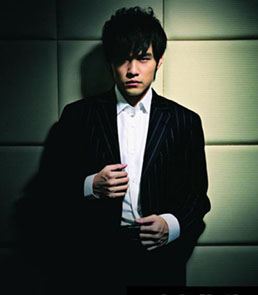Off Island Chinese Singers

|

|
| Jacky Cheung, Jay Chou | |
One Comparison
By Charles Jeffrey Danoff
(August 2010)
Taiwan born Jay Chou's "Hair Like Snow" and Hong Kong born Jacky Cheung's "Song of Trouble" are two modern Mandarin pop songs that critique 21st century existence. I'd would suggest you watch the two videos before continuing in the article to help you along as I compare and contrast the two musically and visually, as well as their treatments of women and men, love and modern malaise.
Here's the Jacky Cheung song/video
Musically
While both are modern pop songs, "Hair Like Snow" and "Song of Trouble" go in different directions. The former features a blend of piano, some electronic turntable splices, and especially some beautiful ladies plucking ancient Chinese string instruments. Jay's voice coo's softly throughout complementing the other elements naturally, creating a relaxing song to listen to and ponder love lost, building to one sharp high not of tension at the four minute mark. The lyrics of the song are heavy on Chinese cultural and philosophical references, like "Red Dust" a Buddhist phrase for "the world,the life on the earth." Overall the lyrics echo this sentiment in one way or another throughout.
Repeated reincarnation"Song of Trouble," on the other hand, is a rather simple, completely modern musical track. In the background one hears a piano and drums playing the same rhythms over and over again throughout the piece. These keep the beat moving, allowing Jacky's voice exclusively to take center stage in the song. He takes the listener up a roller coaster at the beginning:
you frowned your brow closely
cried that the historical beatiful woman can not come back
Even if the history have become ashes
My love never dies
The bustling 3000 years
What you do not love often troubles meAnd then, it goes down as he hits the chorus yelling for the listener to "Shout together / Ask for nothing" accented especially with his "aaaaa ahh aaaa ahh" relaxing you as you hit a neutral point in the ride, then he leads the listener upwards again. Throughout, he sprinkles Buddhist ideas like "pretend to know nothing," "forget everthing but for now" and "all lighter than a feather / then you could eliminate worry."
What you love you can not hug
What you have gotten do not need
What you desire can not come true
Visually
The cinematography of "Hair Like Snow" is epic, drawing the viewer into ancient China with its red lanterns, red dressed courtesans and sword brandishing warriors. One warrior comes into a bar and heads upstairs to spend time with a lovely courtesan. At some point, he perks up and then is with a different woman who was previously playing strings. Next thing, after sipping tea, the second woman is dead, poisoned by the first. Then he has his blade on the first woman's neck ready to strike, but does not. Instead, she tearfully embraces him. W see him sitting down and then pans to the future, where he is sitting and thinking too, and then the courtesan returns wrapping her arms around him. Next scene is in an elevator, the soldier eye's pop open to see the string player enter. They know each other, but are not sure how. Standing outside waiting to be picked up, the soldier's about to talk when the string player's fancy ride arrives, and the jealous courtesan as well. The scene ends with him staring back and her looking at him in the rear view mirror, then a man's hand touching her hand as she smiles.
"Song of Trouble" takes a completely different path going with animated images of dancing modern office workers who have been drawn as LEGO people. The same characters flash in and out of the video alone and together, the action centering around their office. As the music begins, we see people normally interacting in an office, including one point where a character with an Elvis hear cut is berating a dour one. As the song picks up, the dour gentleman has gotten up and thrown his computer on the ground. This rebellion escalates throughout the song as the dancing gets more intense and people start kissing or hitting one another all culminating in everyone walking out of the office together.
Women & Men
The way "Hair" begins with the soldier triumphantly entering then heading up stairs to embrace a stunning courtesan who lays on top of him leads one to believe he is control. This again seems the case when he leaves her to join the musician. But, this image is not completely true. The courtesan seizes control by killing the musician to win back the man and then succeeding, as he is unable to strike her down. This continues in the modern life as the soldier looks confused and bewildered throughout, led around by his girlfriend. The musician does seem to be in an inferior role at the end when she's picked up in a BMW and gives her hand to the unseen male.
In "Song," men again are capricious, as one bald gentleman sluts around the episode kissing two or three of his co-workers. Similarly, it's only the men who are moving around between partners, while the women just have one. That said, as the intensity picks up again, it's the ladies who take the initiative with one scene featuring a pair of seeming lovers talking by a fountain and then all of a sudden the girl is slapping the man and walking away as he furiously chases after. For most of the video though, men and women seem essentially equal- all just bored with office life, preferring to be dancing the night away.
Love & Sex
Chou's song is obsessed with unrealized love as forces conspire in the past and the present to keep Romeo and Juliet apart. Love seems to be the idealized goal, but there also is a sense of just getting on with life. The one tender moment they do enjoy (as well as the soldier's time with the courtesan) are purely chaste. Sex is alluded to, but not seen. The characters do not even kiss- the one simply lays on top of the man as they interlock their fingers together.
For the people in Cheung's song, love is unrealized. This is especially accented by the dour character dancing alone next to a street sign with a no-smoking red slashed circle over a picture of a man and a woman holding hands with a heart behind. There is also the abusive pair mentioned earlier, whose love flames out. Baldy runs around with his three women, but whether that is love or merely promiscuous addiction is not clear. We do get to see the two LEGO people kissing, slighty more yellow (a Chinese reference to pornography, e.g., a "yellow" book), but still pretty innocently. The only creatures who seem to truly find love are the two dogs scampering about throughout the film with hearts all around them.
Modern Malaise
Both songs seem to be a comment on 21st century malaise. The soldier's face 3,000 years ago is quick-witted and alive, leaving his courtesan immediately for his true love. The modern soldier in the suit is confused, sleep walking through life, and fake-smiling to make his girlfriend happy, and unable even to find the courage to talk with the woman he truly loves. The folks in the office seem to be sleep-walking through their days and love-lifes, until Cheung's anthem wakes them up.
Conclusion
While this is just one example each from their vast discographies both seem to be echoing similar themes, despite their visual and aural dichotomies. Each features men with multiple women, but those same ladies are the ones who get violent. Each alludes to sex, but it is pureley chaste in its imagery. Finally, both artists seem to see a numbness that has crept upon us in our modern times. Aside from the sex, sounds a lot like America to me. What'd you think?